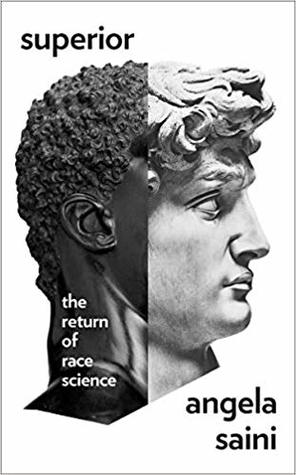
Superior
The Return of Race Science
کتاب های مرتبط
- اطلاعات
- نقد و بررسی
- دیدگاه کاربران
نقد و بررسی

Starred review from April 1, 2019
British science journalist Saini (Inferior: How Science Got Women Wrong) takes an unflinching look at how 19th-century science provided an intellectual framework for the development and ranking of racial categories and the widespread acceptance of eugenics. Though Nazi Germany's genocidal use of racial purity theories forced these ideas into the shadows, racists didn't disappear after World War II. Instead, they moved into less controversial fields, received funding, and began publishing a journal (Mankind Quarterly), allowing them to update old racial prejudices in light of new scientific fields such as population genetics and genomics. With input from many scientists and historians, Saini examines the search for intelligence genes, racialized medicine, statistical racism, and the misuse of genetic research to fit racial agendas. While there's no valid biological or genetic basis for race, some researchers are still intent on searching for it, prompting the author to conclude that intellectual racism is still "the toxic little seed at the heart of academia." VERDICT A well-argued, timely, sobering wake-up call for those who believe science is always objective and apolitical. Highly recommended for academic researchers, journalists, and general science readers alike.--Cynthia Lee Knight, Hunterdon Cty. Historical Soc., Flemington, NJ
Copyright 2019 Library Journal, LLC Used with permission.

April 1, 2019
The racist science behind white supremacy. "The cancerous surge in nationalism and racism around the world has taken many of us by surprise," writes British science writer Saini (Inferior: How Science Got Women Wrong--and the New Research That's Rewriting the Story, 2017). Sadly, as the author shows in this superb study, it should not be so surprising. There have always been scientists prepared to argue that skin color, or brain structure, or our genes, or whatever, indicates the "innate superiority" of whites. This deeply researched and unsettling book blends history, interviews, and the author's personal experiences growing up as an Indian girl in a white working-class section of London. Saini traces the history of modern ideas regarding race since the era of European colonialism, when white Europeans were deemed "better" than others. As she notes, it is "perfectly possible for prominent scientists to be racist....Science is always shaped by the time and the place it is carried out in." The author recounts the racist thinking of crackpot and respectable scientists--past and present--going back to Enlightenment practitioners who argued that nonwhites were inferior. She describes the popular human zoos that displayed people in cages at world's fairs, beginning in the 1800s, and the "well-to-do, gentlemanly race scientists" like Reginald Ruggles Gates (1882-1962), who have held forth over the years. After World War II, race science fell out of favor but soon resurfaced in genetics and other fields that studied human differences. Funding from the Pioneer Fund and others made possible the blatantly racist Mankind Quarterly (1961-present) and the research in Charles Murray's controversial book The Bell Curve (1994). Saini also covers ancestry testing, American exceptionalism, and "black" genes and health. The "virulent racism" of today's social media, right-wing websites, and in mainstream discourse prompted a 2017 Nature editorial against the use of science to justify prejudice. An important and timely reminder that race is "a social construct" with "no basis in biology."
COPYRIGHT(2019) Kirkus Reviews, ALL RIGHTS RESERVED.

May 13, 2019
“The answers are not in our blood, but they are in us,” proposes science journalist Saini (Inferior) in this often brilliant critique of “race science,” the academic attempt to explain inequality between different ethnic groups via biology rather than sociology. Science has, in the past, not just been co-opted by racists, she observes. A number of scientists willingly played a role in abhorrent movements such as Nazism and American eugenics. She observes that, in the 19th century, Darwinism “legitimized racism, rather than quashing it,” by suggesting that, though all humans share a common ancestor, some ancestral groups—such as Europeans—are more evolved than others. More recently, she finds that the National Institutes of Health policy, since 1993, of requiring clinical trials to ask about the racial identity of participants, intended to increase the diversity of those included, has had the “unintended consequence of driving researchers to use , hunting for gaps” between different groups. Occasionally a line in this book misfires. The science enthusiasts who will constitute much of its audience will object, for instance, when Saini asserts, “There is no authenticity except the authenticity of personal experience.” But, just as clearly, this is an important and, in an era of rising racial tensions, must-read book, especially for those most sure they do not need to read it.

























دیدگاه کاربران